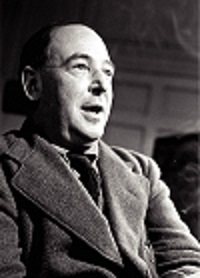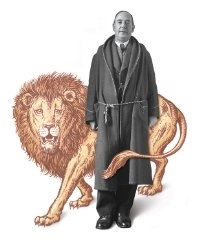 |
| (www.religionnews.com ()) |
"A young man who wishes to remain a sound atheist cannot be too careful of his reading. There are traps everywhere... God is. If I may say it, very unscrupulous" (Lewis). Many Christians look back on what C.S. Lewis wrote and laugh, because there was numerous times where God shaped his life to inspire countless other people. Born on November 29, 1898, Lewis's childhood and adolescence isn't described as joyful or even pleasant. This all stems from his mother's death of cancer, and his father's alienation toward him from this tragedy (Dorsett 1). Lewis became an atheist in adolescence because of this isolation and dejection. Without his God, Lewis was convinced that God's absence was permanent in his life. Years later, Lewis became inspired to learn and write from his mentor, Kirkpatrick, and he became an influential writer. Oxford is where Lewis became a hardworking student, an influential teacher, and where he really indulged in literature to write powerful and inspiring novels. Many of Lewis's books became influential events in his life because of how famous they became among Christians, children, and adults alike. Even today, Lewis's ways of thinking and influence on literature is passed down to the new generations. I believe wholeheartedly that C.S. Lewis is a hero not only because of his significant work as a writer and teacher, but because he developed a strong character in faith. A hero must possess wisdom or a will to learn from their past experiences to teach others based on their failures and achievements. Clive Staples Lewis, the author behind imaginative and inspirational works of literature, is a hero based on his life as an articulated writer, and intelligent teacher, and a wise Apologetic Christian.
 |
| (www.goodreads.com ()) |
C.S. Lewis's name and character grew to be known to every generation through his articulation, putting his philosophies and wisdom into words. For example, a popular known book in the Christian community, Mere Christianity, is remembered today because of how his words flow through the pages. "You might as well say that the sheet of music which tells you, at a given moment, to play one note on the piano and not another...The Moral Law tells us the tune we have to play: our instincts are merely the keys" (Lewis 10). Based on Lewis's stand on the Law of Human Nature, one's instincts on what to do in a situation is formed from their sense of being morally right or wrong. This moral belief persuades the choice of a person to do right or wrong. Portrayed through, not only Mere Christianity, but many of Lewis's books are ways of thinking so the reader may understand his ideas through common sense and metaphors. Another influential books in the Christian community is Lewis's partial autobiography, Surprised by Joy, where it highlights Lewis's journey to Christianity. "Really, a young Atheist cannot guard his faith too carefully. Dangers lie in wait for him on every side" (Lewis 226). Lewis's logical articulation in his faith influences and provokes the way some people think today. However, before becoming an Apologetic Christian, Lewis was an atheist who questioned and didn't understand what it meant to be a Christian. Years after his conversion, Lewis grew to understand how to protect what he believed because he was once a skeptical non-believer. This skepticism drove Lewis to research the Bible, and spiritually question if what he believed as an atheist to be correct. By reading his books, Mere Christianity and Surprised by Joy it's obvious that he found what he struggled with as an atheist, and from these books others may learn the truth as well. Lewis's writings are still read today, transcending the erosion of time, they still teach readers new ways of thinking, provoking their minds to ponder the way Lewis wanted the world to believe ("C(live) S(taples) Lewis.").
 |
| (www.ox.ac.uk ()) |
Throughout his years as a student and teacher, Lewis developed intelligence that contributed to his eagerness to learn and especially teaching. Lewis's intelligence developed through his years at Oxford, and this helped flourishing his love for literature, "...he always maintained his home and friends in Oxford. He loved the bookshops... in the company of local men who loved to read, write, and discuss books. His attachment to Oxford was so strong..." (Dorsett 2). Lewis's love for books knew no bounds, starting from Oxford's library. The education he received from Oxford influenced his life and his writing, and it grew, becoming a professor at the same university. Lewis lived for writing and his education as he lived in Oxford. It's no wonder he is worldly known today for being a literary enthusiast, or a English teacher and novelist. After his years as a college student, Lewis never actually left, becoming an influential and gifted professor at Oxford, "Lewis's students 'found him extremely conscientious, astonishingly well-read, astute in judgment, and generous in character," Russell said. 'His lectures were popular, both for their lively delivery and their rich content, for he drew from the great breadth of his voracious reading" ("C(live) S(taples) Lewis." 11). Lewis's love for school and learning gave him an expertise in the field of teaching. His authority and power to share his knowledge was infectious among his students and those of other classes. Lewis exhibited his intelligence and character by influencing his students through his philosophies and past experiences. Lewis never stopped teaching, even decades after his death; influencing the way people today think about their faith and life.
 |
| (thatishouldgain.wordpress.com ()) |
As a Christian, Lewis grew Christ like characteristics, including his wisdom and will to teach others God's love, and how to protect that love. After nearly a lifetime of atheism, Lewis found his way to Christianity and wisdom beyond the physicality of world. "And even though he felt called by God to write, he likewise felt it was required of him to counsel those who made the pilgrimage to The Kilns, his home on the edge of Oxford. Frequently he believed it was his calling to explain the Christian faith to people" (Dorsett 5). His wisdom is a spiritual intelligence that is unworldly, and those of this world are non-believers and young believers, still new to the idea of "Christianity." From his commitment to God, Lewis wanted to nurture these growing believers through his writing and books, impacting readers as if it were his obligation. This obligation influenced many of his books, helping readers grow in their spiritual intelligence to one day understand what it means to be "Christian." Moreover Christianity, Lewis is arguably most famous for his fantasy adventure series, The Chronicles of Narnia, and a reason why is because of his unconcealed wisdom of Christ's character, "For example, Aslan, the great lion who created Narnia through a song, is 'a thinly disguised Christ figure..." ("C(live) S(taples) Lewis." 16). Based on Christ and what he did in his life, Lewis's knowledge and experiences of his Savior gave him wisdom. This wisdom grew into a character of great humility, and sacrificing himself to overcome an infamous evil. Aslan is Lewis's vision of God's true character, and he perfectly portrays God's traits in one of the most influential characters in literacy. Once again, Surprised by Joy shows Lewis's struggle in atheism, "A young man who wishes to remain a sound atheist cannot be too careful of his reading. There are traps everywhere... God is. If I may say it, very unscrupulous" (Lewis). Throughout his years of atheism, Lewis believed there wasn't a God. However he later realized it was nearly impossible to avoid God's creation and existence. So, he concluded that in his adolescence, Lewis didn't believe that there wasn't a God, but he felt punished and isolated from God like his father. From this conclusion, Lewis became convinced, and converted to theism based on the knowledge he obtained through his "separation" from God. Lewis became one of the first Apologetic Christians of his time, because of his wisdom from the Bible, God's character, and awareness of God's presence in his life.
As an articulated writer, and intelligent teacher, and a wise Apologetic Christian, Lewis inspires people through his inspirational works becoming a literary hero of his own. After his long awaited conversion, it became his first step into Christianity. Gaining wisdom he would use to share through his books, and Lewis is remembered today because of his timeless wisdom through his books. He understood that his views and ways of thinking should be shared to everyone. From Lewis's knowledge and wisdom gathered through his life, he was able to articulate words to defend his faith. However, many people wouldn't understand because of their differences of faith, resulting in confusion or even persecution. Despite this, Lewis's wisdom and philosophies of Christianity provokes the minds of all his readers, including me. This is why C. S. Lewis is a Hero. Through his books, he has never been forgotten by time, nor will he ever be forgotten, "But in this book I am not trying to convert anyone to my own position. Ever since I became a Christian I have thought that the best, perhaps the only, service I could do for my unbelieving neighbours was to explain and defend the belief that has been common to nearly all Christians at all times" (Lewis VIII).
Works Cited
"C(live) S(taples) Lewis." Major Authors and Illustrators for Children and Young Adults.
Detroit: Gale, 2002. Biography in Context. Web. 27 Jan. 2016.
Dorsett, Lyle. "C. S. Lewis: A Profile of His Life." C.S. Lewis Institute. N.p., n.d. Web. 27 Jan. 2016.
Lewis, C. S. Mere Christianity & the Screwtape Letters: Complete in One Volume. San
Francisco: HarperSanFrancisco, 2003. Print.
Lewis, C. S. Surprised by Joy: The Shape of My Early Life. New York: Harcourt, Brace, 1956.
Print.
Page created on 7/15/2016 12:00:00 AM
Last edited 11/17/2018 3:59:17 PM
